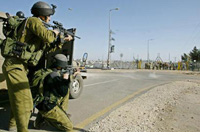Israel to remove troops from Lebanon within two weeks
Israel plans to end the naval blockade of Lebanon in two days. A government official said Israel would withdraw its troops from the war-torn country during two weeks.

Read more about the violent Israel-Lebanon standoff on Pravda.Ru
The lifting of the sea blockade and the pullout of remaining troops would wind up Israel's recent campaign against Hezbollah guerrillas in Lebanon, and allow desperately needed reconstruction projects there to proceed freely. Up to 15,000 Lebanese soldiers backed by an equal number of international forces are deploying in southern Lebanon to replace the Israelis under an Aug. 14 truce.
Israel sealed off Lebanon by air and sea at the start of its war against Hezbollah to keep Syria and Iran from resupplying it with arms. Israel, yielding to intense international pressure, ended its air blockade of Lebanon on Thursday, but said it would maintain the naval blockade until international peacekeeping vessels arrived to monitor the seas.
Israeli Prime Minister Ehud Olmert has not set an exact date for ending the naval blockade, but the U.N. has informed Israel that its naval force would be ready to take over "within 48 hours," enabling Israel to withdraw its ships, government spokesman Asaf Shariv said Friday.
Army Radio said the blockade would end Saturday night.
Another government official, speaking on condition of anonymity, said the U.N., not Israel, was holding up the handover. "As soon as the international naval task force is ready to receive naval responsibility, we are more than willing to turn it over," the official said, unable to speak for the record while the closure was still in effect.
U.N. chief Kofi Annan, who led the international campaign to lift the blockades, has also been pressing Israel to withdraw all its soldiers from Lebanon once 5,000 U.N. peacekeepers deploy there by mid-September.
At a meeting Thursday, Israeli security officials said the target was to have the remaining thousands of troops out by the Jewish New Year, which begins the evening of Sept. 22, security officials said.
Israel has been gradually pulling out its soldiers - whose number peaked at 30,000 at the war's end - as international replacements arrive.
About 3,250 U.N. troops are now in place. On Thursday, the Spanish parliament voted to contribute 1,100 soldiers to the peacekeeping mission, and the first troops were to set off on Friday.
In related news, Israeli Prime Minister Ehud Olmert has signaled that Israel might cede disputed territory to Lebanon if the Lebanese carry out all provisions of the cease-fire agreement, including disarmingHezbollah.
In a meeting with Russian Minister Sergey Lavrov on Thursday, Olmert said if the U.N. decides the area is Lebanese, and if Lebanon fully implements a U.N. resolution ending the war, then Israel would agree to put the matter on the table, government officials said.
When Israel withdrew its troops from southern Lebanon in 2000, ending an 18-year occupation, the U.N.-drawn international line did not put Chebaa Farms in Lebanese territory, but in the Golan Heights, which Israel captured from Syria in 1967, and later annexed.
The Lebanese have disputed this ruling, and Israel and Hezbollah have clashed in the territory since the withdrawal. Under the Aug. 14 cease-fire, the U.N. agreed to review the line within 30 days.
Lebanon put on a boisterous show Thursday to celebrate the end of Israel's air blockade. In a symbolic act signaling the resumption of normal air traffic, a commercial flight by Lebanon's national carrier Middle East Airlines circled over downtown Beirut three times at 6:04 p.m., four minutes after the embargo ended. And fireworks erupted in the capital's heart.
"Lebanon is breathing again," proclaimed Prime Minister Fuad Saniora in a televised statement, inviting the tens of thousands of Lebanese who fled the fighting and Arab tourists who left in droves "to come back to the Lebanon you love."
The land route to neighboring Syria has already been reopened, with the Lebanese government posting thousands of troops along the rugged frontier to prevent smuggling.
While Lebanese celebrated the end of the air siege, Olmert's government came under sharp criticism from the families of two Israeli soldiers captured by Hezbollah in a cross-border raid that touched off the war. The families said the lifting of the blockade robbed Israel of negotiating leverage.
After meeting with Olmert, relatives of the soldiers - Ehud Goldwasser and Eldad Regev - accused the Israeli leader of caving in to international pressure.
"This is the second time the government has acted against the will of the people of Israel," said Regev's brother, Benny. "The first was the cease-fire, and now it's with the lifting of the blockade of Lebanon."
Since the cease-fire, Olmert repeatedly pledged to bring the men home safely, and Annan has appointed a mediator to handle indirect talks between Israel and Hezbollah, the AP says .
Hezbollah has said it would free the two only in exchange for Arab prisoners held by Israel. Israeli publicly has demanded the soldiers' unconditional release, but in the past has exchanged prisoners.
Subscribe to Pravda.Ru Telegram channel, Facebook, RSS!


